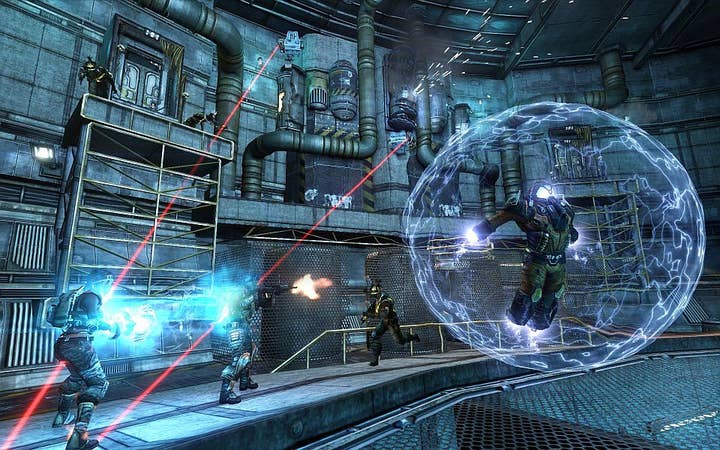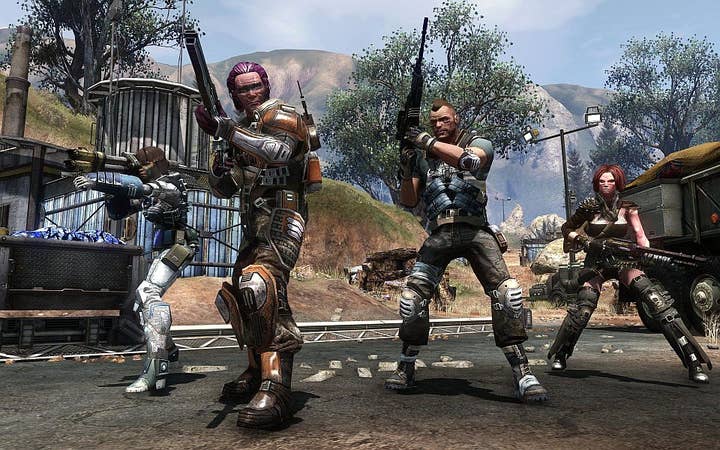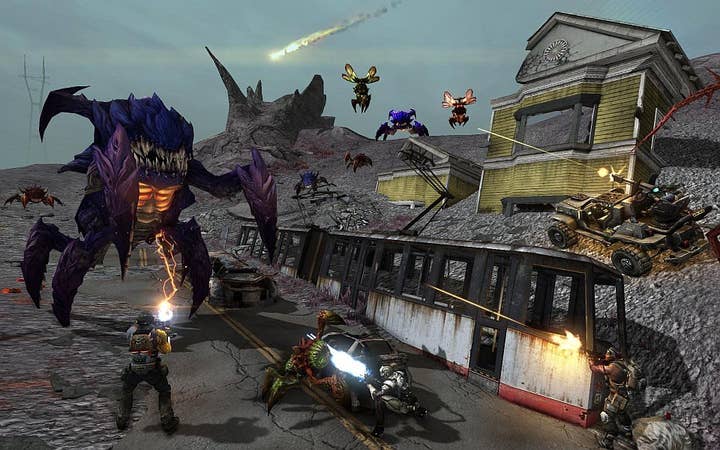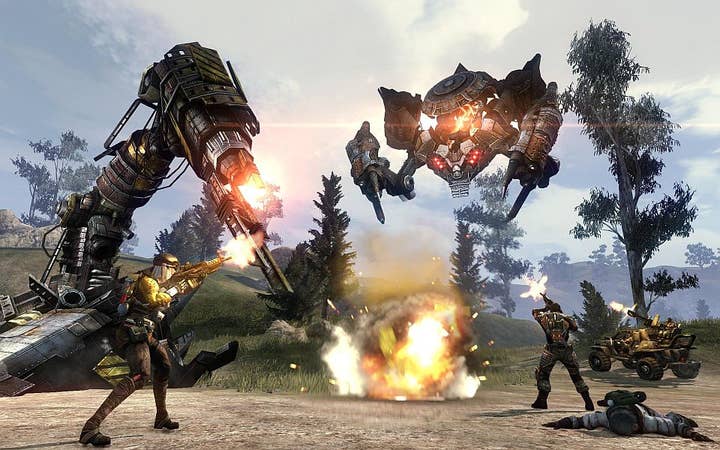Trion and Syfy redefine licensing with Defiance
Trion SVP Nick Beliaeff on how this game and TV show developed together
There have been many games based on TV shows and movies, and movies based on games, but few have been very good. Trion Worlds and Syfy are looking to change that perception, and indeed the whole idea of how an intellectual property is developed for both a game and a television series. GamesIndustry International sat down with Nick Beliaeff, senior vice president of development for Trion Worlds, to discuss how this project was structured.
Beliaeff explained how Defiance differs from a standard arrangement between of a game being licensed from a TV show, or vice versa. "We're about to hit our 5 year anniversary of working on this," Beliaeff said. "The real difference is that both sides have been together on the project from day one. You look at the traditional games and Hollywood model, whether it's TV show or movie based on a game or vice-versa, there's generally a licensee and licensor. That creates a master and servant relationship, and whoever the licensee is they generally have to make concessions to license. In general terms, if you're making concessions you're not doing what's optimal for your product and you're compromising the quality of your product."
Beliaeff continued, "Both sides really wanted to avoid that. Syfy on their end wanted to make the best television show possible, and Trion on our end wanted to make the most fun game possible, and we really didn't want to compromise. I think the big thing for us is this isn't a licensee/licensor affair; it's something where both parties have been in together from day one knowing from the onset of the project that Defiance is one IP, and it's big enough and broad enough that it can have a television show and an online shooter and neither have to make compromises."
Of course, even with the best cooperation possible there were times when what you want to do for the game conflicts with something in the TV series, or vice versa. The process of resolving those conflicts helped create a better product for both sides, Beliaeff believes. "It's certainly happened, where one side is passionate about something and the other side is like, 'No way, no how,'" Beliaeff said. "It's really about having a series of constructive arguments about what's best for the overall IP."
"The real difference is that both sides have been together on the project from day one"
Nick Beliaff
Beliaeff provided an example. "On the show side of things, where they're set in St. Louis, it was important to them that they had a frontier feel to it. One of the things they were really interested in pursuing were horses. For us, we're making a shooter, it was 'OK, now we're going to have this third-person shooter, our game's optimizing for bipeds, and now we're going to have bipeds on top of quadrupeds?' We were saying, 'No, we can't have horses, bio-engineered horse or anything like that, because it will just kill us.' Plus, we're a per-pixel accurate shooter, and you do that and you're a giant target and that's not going to be fun."
The problem also occurred in the other direction. "What we thought would be awesome was flying," Beliaeff said. "Vehicle gameplay is so important in a shooter, and flying's real neat, so we want to have flying. They said, 'Well, on the game side your entire budget is pretty much CG.' For them, while they have a pretty impressive CG budget, having flying being a regular part of the show would kill them. So in that case, it helped where in the mythology where we've got the Ark ships exploding we created this low-hanging asteroid field, and it helped us evolve the mythos where we took something that could have been problematic and made it part of our lore and history."

Pressed for details of how exactly these issues were resolved in the game, Beliaeff didn't want to reveal exactly what solutions were reached. He did point out that both sides were keeping the fate of the project in mind. "When we got into these arguments, our ultimate goal wasn't for one side to win and one side to lose, and I think that's the point. It was really how do we make the best decision for Defiance so that people are really going to have a great experience in it."
Fundamentally, though, a good TV series is about drama and character, while a game needs to be about game play, strategy and tactics, and fun. How do you reconcile that? "There are different sorts of stories that are being told," Beliaeff replied. "On the TV side, it's a character story; they want interesting characters and a deep narrative over time that gives people a chance to fall in love with the characters. On the game side, we're telling two different stories. One is the story of the player as an individual in the world and how they affect the world as an Ark Hunter in San Francisco. Because this is a persistent online game, whether you are logged in or not the world is going to move on without you. That's really the secondary story, the world of Defiance progressing through time and then how you as an individual affect that."
"What we can't do is make it that you have to watch the show to enjoy the game; we think that would be crippling"
Nick Beliaff
Beliaeff felt the game team was focused on the right things. "I don't disagree with you that the most important thing in the game is are you having fun with the game, are the guns cool, and all that sort of stuff - but storytelling, particularly with our link with the television show, becomes that much more important." Beliaeff said.
Events in the TV show affect the game, and vice-versa, but just how synchronized are the events between the TV show and the game? "They're synchronized within an inch of their life," Beliaeff laughs. "That's the whole goal. That's some of the secret sauce that we think we have, just making sure that whenever an episode of the show is on air there's a big beat happening in the game. Our real goal is whether it's from game to show or show to game, that those big beats are happening whenever there's an episode on."

The scope of the project makes synchronization difficult. "Defiance is a worldwide project, we're releasing the game simultaneously in North America and Europe, in English, French, and German," Beliaeff said. "The show is launching the same week in North America and Europe. In some countries it might not be the same day but it is the same week, so we took a horseshoes and hand grenades approach to it, where close counts. It's not like 'Hey the premiere of the show is at 9 o'clock and it ends at 10, so at 10:01 in the game, boom! Trigger the switch.' It's that week."
Beliaeff provided an example of how the game and the TV show will interact: "In one of the episodes of the show, we have an Indogene doctor who figures out there's this nanite contagion spreading and it could doom the town," Beliaeff said. "So she reaches out to her counterpart in the game in San Francisco and now the players in the game have a series of missions that they can fulfill, getting reagents an trying to help the doctor in San Francisco create the cure. The time pressure on the players is they need to do it before next week's episode airs."
What happens if the players fail? "You should watch the next week's episode and see," Beliaeff laughs. "We have our plans; how this goes forward and how this works, we have it closely choreographed. We feel very confident in our plans and whether you're a fan of the show or the game you're going to be satisfied with the outcome."
Given this level of interaction, it's easy to see why this project has taken five years to arrive. "Every once in a while I get asked questions like, 'If you guys have some success with this, are you worried about people coming in and mimicking this?' And I say, 'Not any time soon, no.' This whole relationship between Trion and Syfy is unique," Beliaeff said. "It's easy to look at where we are now and forget you're looking at the culmination of 5 years of work. We've got over 200 people working on the game at this point. Particularly when they were filming the show, we'd have thirty or forty people talking every single day across every single department."
Sharing the CGI assets has been an important part of the process, according to Beliaeff. "We use a lot of the same underlying software between the two groups, and that's made sharing assets really easy," he noted. "Trion created the models for the bad guys called the Volge showing them drawing a weapon from a holster. Later, artists working on the TV show didn't think this automaton drawing a weapon from a holster made sense in a holistic way, so they changed it... the weapon just sort of popped out of the arm of the armor. When we saw that in the dailies, we're like 'Aw, shit, that's so much better than what we did, we totally have to incorporate that in the game.'"
"When we started this project transmedia as a word did not exist. We found out what we were doing a few years into it"
Nick Beliaff
This one thing eventually made a substantial difference to both the TV show and the game. "What ended up happening was the two art teams ended up riffing off each other," Beliaeff said. "Where we we just going to have one Volge we have bout a half-dozen different Volge, we had to write a whole bunch of different lore and back story for them, and you'll see all of them in both the game and the show. It's one of the cases where the synergy worked, where these two teams in two different mediums acted as a force multiplier on each other."
Ideally the game and the TV show would both be equally successful; but what if they aren't? "For us, the game as a game has to be a great and entertaining game without benefit of the show," Beliaff said. "If you look at any online game, like World of Warcraft or EverQuest, if they have any sort of following they last for years and years. Successful shows that don't last for that long a time. We've always had it in the back of our head that we're going to have to exist without the show no matter what. They have to make the best show they can possibly make, and if they get the benefit of people crossing over and also seeing the game they'll have a better experience. The same thing for us; our foundation has to be a great game and we can make it an additive experience if you also watch the show."

Beliaeff explained that this concept also came with a caveat. "What we can't do is make it that you have to watch the show to enjoy the game; we think that would be crippling. Whether you look at the show or the game, there's two different ways to get to the world of Defiance, but it's one world, and if you take them together it's a better experience."
The game is unsharded; everyone appears in the same universe, so "you can see thousands of people when you traverse this shardless world," according to Beliaeff. There's a lot of dynamic content, which Trion pioneered in Rifts. Some missions will require cooperation of dozens or even fifty or more players to accomplish, while there are also individual things to do as well as small group missions. The game also has PvP options, co-op maps and versus maps. "We go from groups of five to thousands," noted Beliaff. "We make sure we do really interesting things with scale, whether it's our open versus mode or co-op you can do with different groups of people."
Defiance will use a hybrid business model, where players will pay for the game up front but online play will be free. DLC packs and virtual goods will be options to purchase for players who want to add more to the game.
The realm of transmedia properties doesn't just stop at TV and games; many have extended across other areas such as graphic novels, animation, novels, toys and more. Defiance won't go there immediately, though."We absolutely are, but right now we're really focused on launch," Beliaeff said. "We think we have challenge enough right now. When we started this project transmedia as a word did not exist. We found out what we were doing a few years into it."
Defiance is scheduled for release in April, and pre-orders have now opened up for Defiance on Xbox 360, PS3 and PC. Pre-orders include an invite to the beta along with a variety of special bonuses. A complete breakdown of all the Defiance platform editions can be viewed here.









